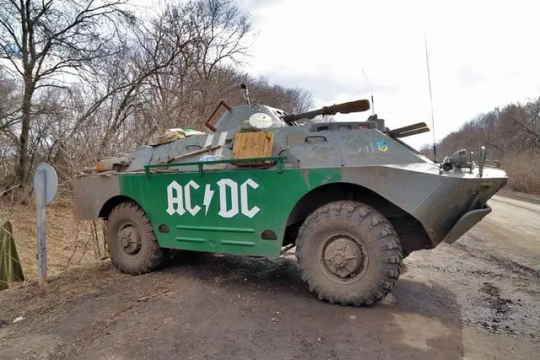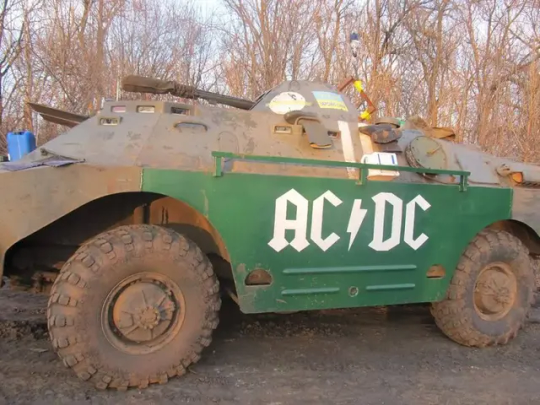#russo-Ukrainian war
Explore tagged Tumblr posts
Text

Ukrainian T-72AV crewman inspecting his MBT, January 2025 period, Donetsk Oblast
185 notes
·
View notes
Text
A dear filmmaker friend of mine recently congratulated me & said "you have achieved what 95% of filmmakers never achieve - you have actually made a film." My directorial debut The Battle for Kyiv premieres in London in less than 48 hours, and I can't wait to share it with you.
291 notes
·
View notes
Text

#ukraine#russo-ukrainian war#russo ukrainian war#russian invasion of ukraine#forced conscription#forced conscription in occupied territory
150 notes
·
View notes
Text
Much of the public discussion of Ukraine reveals a tendency to patronize that country and others that escaped Russian rule. As Toomas Ilves, a former president of Estonia, acidly observed, “When I was at university in the mid-1970s, no one referred to Germany as ‘the former Third Reich.’ And yet today, more than 30 years after the fall of the Berlin Wall, we keep on being referred to as ‘former Soviet bloc countries.’” Tropes about Ukrainian corruption abound, not without reason—but one may also legitimately ask why so many members of Congress enter the House or Senate with modest means and leave as multimillionaires, or why the children of U.S. presidents make fortunes off foreign countries, or, for that matter, why building in New York City is so infernally expensive.
The latest, richest example of Western condescension came in a report by German military intelligence that complains that although the Ukrainians are good students in their training courses, they are not following Western doctrine and, worse, are promoting officers on the basis of combat experience rather than theoretical knowledge. Similar, if less cutting, views have leaked out of the Pentagon.
Criticism by the German military of any country’s combat performance may be taken with a grain of salt. After all, the Bundeswehr has not seen serious combat in nearly eight decades. In Afghanistan, Germany was notorious for having considerably fewer than 10 percent of its thousands of in-country troops outside the wire of its forward operating bases at any time. One might further observe that when, long ago, the German army did fight wars, it, too, tended to promote experienced and successful combat leaders, as wartime armies usually do.
American complaints about the pace of Ukraine’s counteroffensive and its failure to achieve rapid breakthroughs are similarly misplaced. The Ukrainians indeed received a diverse array of tanks and armored vehicles, but they have far less mine-clearing equipment than they need. They tried doing it our way—attempting to pierce dense Russian defenses and break out into open territory—and paid a price. After 10 days they decided to take a different approach, more careful and incremental, and better suited to their own capabilities (particularly their precision long-range weapons) and the challenge they faced. That is, by historical standards, fast adaptation. By contrast, the United States Army took a good four years to develop an operational approach to counterinsurgency in Iraq that yielded success in defeating the remnants of the Baathist regime and al-Qaeda-oriented terrorists.
A besetting sin of big militaries, particularly America’s, is to think that their way is either the best way or the only way. As a result of this assumption, the United States builds inferior, mirror-image militaries in smaller allies facing insurgency or external threat. These forces tend to fail because they are unsuited to their environment or simply lack the resources that the U.S. military possesses in plenty. The Vietnamese and, later, the Afghan armies are good examples of this tendency—and Washington’s postwar bad-mouthing of its slaughtered clients, rather than critical self-examination of what it set them up for, is reprehensible.
The Ukrainians are now fighting a slow, patient war in which they are dismantling Russian artillery, ammunition depots, and command posts without weapons such as American ATACMS and German Taurus missiles that would make this sensible approach faster and more effective. They know far more about fighting Russians than anyone in any Western military knows, and they are experiencing a combat environment that no Western military has encountered since World War II. Modesty, never an American strong suit, is in order.
— Western Diplomats Need to Stop Whining About Ukraine
#eliot a. cohen#current events#politics#ukrainian politics#american politics#warfare#strategy#tactics#diplomacy#russo-ukrainian war#2022 russian invasion of ukraine#war in afghanistan#vietnam war#ukraine#usa#toomas hendrik ilves
517 notes
·
View notes
Text
Imagine that someone—perhaps a man from Florida, or maybe even a governor of Florida—criticized American support for Ukraine. Imagine that this person dismissed the war between Russia and Ukraine as a purely local matter, of no broader significance. Imagine that this person even told a far-right television personality that “while the U.S. has many vital national interests ... becoming further entangled in a territorial dispute between Ukraine and Russia is not one of them.” How would a Ukrainian respond? More to the point, how would the leader of Ukraine respond?
As it happens, an opportunity to ask that hypothetical question recently availed itself. The chair of the board of directors of The Atlantic, Laurene Powell Jobs; The Atlantic’s editor in chief, Jeffrey Goldberg; and I interviewed President Volodymyr Zelensky several days ago in the presidential palace in Kyiv. In the course of an hour-long conversation, Goldberg asked Zelensky what he would say to someone, perhaps a governor of Florida, who wonders why Americans should help Ukraine.
Zelensky, answering in English, told us that he would respond pragmatically. He didn’t want to appeal to the hearts of Americans, in other words, but to their heads. Were Americans to cut off Ukraine from ammunition and weapons, after all, there would be clear consequences in the real world, first for Ukraine’s neighbors but then for others:
If we will not have enough weapons, that means we will be weak. If we will be weak, they will occupy us. If they occupy us, they will be on the borders of Moldova and they will occupy Moldova. When they have occupied Moldova, they will [travel through] Belarus and they will occupy Latvia, Lithuania, and Estonia. That’s three Baltic countries which are members of NATO. They will occupy them. Of course, [the Balts] are brave people, and they will fight. But they are small. And they don’t have nuclear weapons. So they will be attacked by Russians because that is the policy of Russia, to take back all the countries which have been previously part of the Soviet Union.
And after that, if there were still no further response? Then, he explained, the struggle would continue:
When they will occupy NATO countries, and also be on the borders of Poland and maybe fight with Poland, the question is: Will you send all your soldiers with weapons, all your pilots, all your ships? Will you send tanks and armored vehicles with your young people? Will you do it? Because if you will not do it, you will have no NATO.
At that point, he said, Americans will face a different choice: not politicians deciding whether “to give weapons or not to give weapons” to Ukrainians, but instead, “fathers and mothers” deciding whether to send their children to fight to keep a large part of the planet, filled with America’s allies and most important trading partners, from Russian occupation.
But there would be other consequences too. One of the most horrifying weapons that Russia has used against Ukraine is the Iranian-manufactured Shahed drone, which has no purpose other than to kill civilians. After these drones are used to subdue Ukraine, Zelensky asked, how long would it be before they are used against Israel? If Russia can attack a smaller neighbor with impunity, regimes such as Iran’s are sure to take note. So then the question arises again: “When they will try to occupy Israel, will the United States help Israel? That is the question. Very pragmatic.”
Finally, Zelensky posed a third question. During the war, Ukraine has been attacked by rockets, cruise missiles, ballistic missiles—“not hundreds, but thousands”:
So what will you do when Russia will use rockets to attack your allies, to [attack] civilian people? And what will you do when Russia, after that, if they do not see [opposition] from big countries like the United States? What will you do if they will use rockets on your territory?
And this was his answer: Help us fight them here, help us defeat them here, and you won’t have to fight them anywhere else. Help us preserve some kind of open, normal society, using our soldiers and not your soldiers. That will help you preserve your open, normal society, and that of others too. Help Ukraine fight Russia now so that no one else has to fight Russia later, and so that harder and more painful choices don’t have to be made down the line.
“It’s about nature. It’s about life,” he said. “That’s it.”
#current events#warfare#politics#russian politics#american politics#russo-ukrainian war#2022 russian invasion of ukraine#russia#ukraine#usa#volodymyr zelenskyy#ron desantis#nato
245 notes
·
View notes
Text
ЗСУ знищили вже понад 35100 одиниць автомобільної техніки та 830000 рашистів
Століття протистояння з поріддям Золотої Орди. “Криваве багно монгольського рабства, а не груба слава норманської епохи, є колискою Московії, сучасна ж Росія є лише метаморфозою Московії”. Стадо убивць, ґвалтівників, руйнівників, крадіїв і збоченців, яке наразі називає себе прикметником “русскіє”, розуміє лише силу та зупиняється тоді, коли добряче “отримає по рогах”. Одинадцятий рік…

View On WordPress
#ЗСУ#Збройні Сили України#Рашизм#Російське вторгнення в Україну#Російсько-українська війна#Russian Crimes#Russo-Ukrainian War
11 notes
·
View notes
Text
Hey there, everybody, I hope you're all having a Happy Thanksgiving! Just be mindful, though, that there are companies that - despite massive evidence of Russia's war crimes - continue to do business in Russia, including Subway, PepsiCo and Unilever. Read the full list in Wikipedia's article on the International Sponsors of War:
#Thanksgiving#Happy Thanksgiving#Russia#Ukraine#Россия#Україна#Russo-Ukrainian War#Russian Invasion of Ukraine#War in Ukraine#Stand with Ukraine#Russian aggression#Russian war crimes#Genocide of Ukrainians#International Sponsors of War#Міжнародні спонсори війни#fuck Russia#Russian Imperialism#Stop Russia#Russia is a terrorist state#Subway#subway sandwich#Pepsi#PepsiCo#Unilever
17 notes
·
View notes
Text

Yesterday was the Day of the National Flag and today is the Independence Day of Ukraine.
Victory and peace to those of us who are alive on this day. Eternal glory to the heroes who died for us, our freedom and our home. We will not forget all those who have been killed. We will not forget who killed them, and we will never forgive it.
Be safe (as safe as you can be) and take care of yourself. Слава Україні.
#Ukraine#The Independence Day of Ukraine#russo-Ukrainian war#obligatory FUCK YOU rUSSIA of course#russia is a terrorist state#my art
120 notes
·
View notes
Text

Ukrainian SOF sniper team comprised of international volunteers operating in southern Ukraine.
188 notes
·
View notes
Text

Ukrainian soldiers reenact the "Reply of the Zaporozhian Cossacks"
212 notes
·
View notes
Text

German-supplied Bergepanzer 2 armored engineering vehicle in Ukrainian service, sporting a massive number of Kontakt-1 ERA bricks.
126 notes
·
View notes
Text
Cockpit view from a flight of Ukrainian Mi-24 Hind helicopter gunships on a strike mission, flying down a shallow river valley in Donetsk Oblast. More extreme low level Ukrainian Hind piloting.
78 notes
·
View notes
Text


Ukrainian BRDM-2 "AC/DC", 2014
74 notes
·
View notes
Text

Ukrainian soldier with an improvised 14.5mm anti-material rifle. I think he's using a M2HB as a swivel mount.
79 notes
·
View notes
Text
Ukrainian forces recover large, relatively intact pieces of the advanced Russian S-70 Okhotnik UCAV that crashed in Donetsk Oblast after being shot down by friendly fire. Notably including the wing segment seen in this video. 5 Oct 2024

109 notes
·
View notes
Text
Cockpit view from a Ukrainian Army Aviation Mi-24VP Hind helicopter gunship skimming low over Donetsk Oblast. Hiding under Russian radar coverage while heading to the front.
82 notes
·
View notes